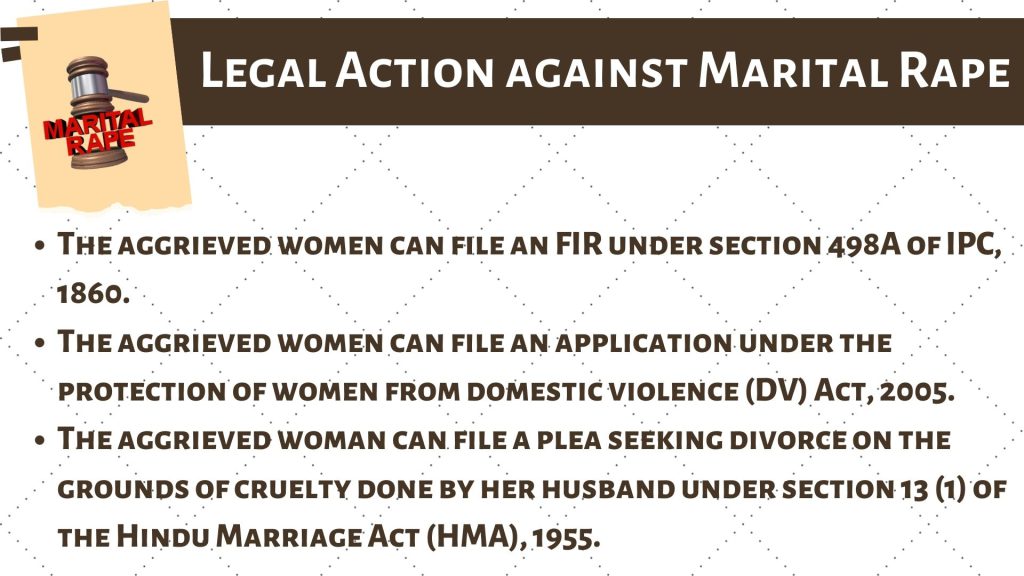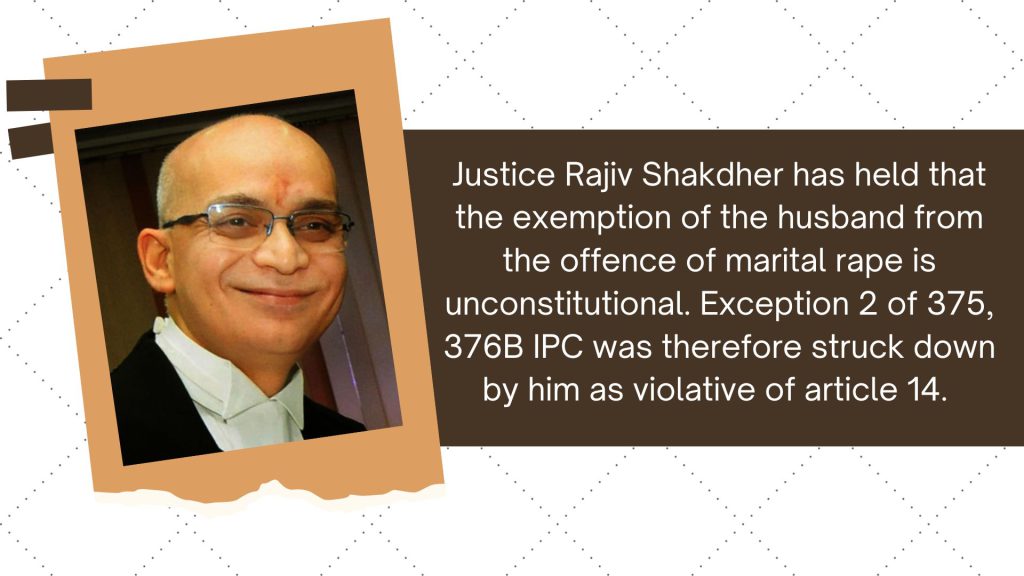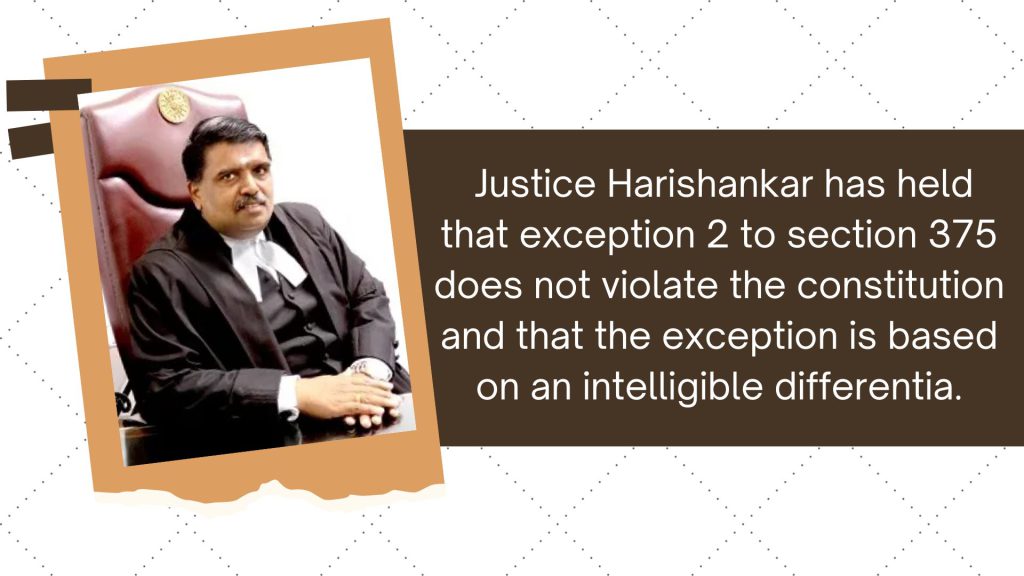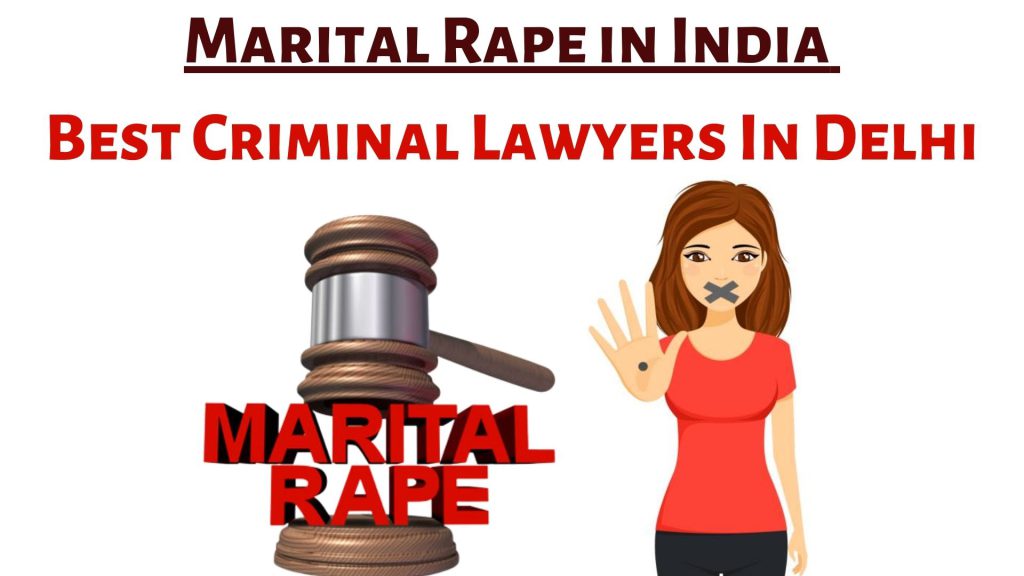Introduction
Recently, a bench of two judges delivered a split verdict on the issue of criminalizing marital rape.
The primary issues that were raised during the judgement were
- Whether marriage grants the husband expectations for sexual relations with his wife and results in implied consent from her.
- Whether striking down the exceptions will create a new offence of marital rape.
Marital rape in India is not a crime according to section 375(2) of the Indian Penal Code (IPC), 1860, striking down the exception will result in making marital rape an offence in India. Also, India is one of the few countries around the world that does not treat non-consensual sex within marriage as rape.
Let us discuss what section 375 (2) of the IPC is all about.
Keep reading!
What is Section 375 (2) of IPC?
Section 375 of IPC lays down certain sexual acts done by a man with a woman in the absence of her consent or against her will that constitute rape. However, the provision provides two expectations which are as follows
- A medical procedure or intervention
- Sexual intercourse or acts by a man with his wife.
Earlier the age limit for the wife was 15 years. It was later increased to 18 years by the Supreme Court in October 2017.
What is the history of Marital Rape in India?
In the year 2000, the law commission of India did not consider the need to remove the exception of marital rape while it was considering several reforms to India’s laws on sexual offences that were proposed.
After the result of the Nirbhaya gang rape case, a committee headed by justice JS Verma was formed to propose amendments to the Indian rape laws. while some recommendations were accepted, which resulted in the criminal law (amendment ) act, of 2013, others including modifications to the marital rape provisions were rejected.
The arguments are being heard in the Delhi High Court since 2017.
However, this is not the first time that the matter of criminalizing marital rape has been raised and questioned in India.
When this issue was brought up in parliament in 2015, the home minister rejected the idea of criminalizing marital rape at that time. It was stated by him that since marriage is considered a sacred affair in India and hence marital rape cannot be constituted as an offence in India.
Why Marital Rape in India is not an offence?
IPC 1860 came into existence in India during the colonial rule of the British. It is based upon a draft which was drafted by Lord Macaulay in the year 1847. He was the chairman of the First Law Commission of India.
The exception was applicable only to women who are above 10 years of age in the first version of the code. This limit was increased to 15 years in 1940 and further to 18 years in 2017.
The expectation of marital rape is also primarily influenced by the following two colonial-era doctrines:
- The doctrine of Hale, According to the doctrine of Hale, a man cannot be held guilty of raping his wife since she has given herself up in this regard to her husband by their matrimonial consent and contract. The doctrine was laid down by Matthew Hale in 1736.
- The doctrine of coverture, According to the doctrine of coverture, a woman loses her legal identity after her marriage. The husband and wife are one person after their marriage as the identity of the wife consolidate with that of her husband. As a result, the woman cannot act against her husband’s will.
Does criminalizing Marital rape make it an offence?
One of the primary issues that have been raised by one of the judges in the recent proceedings is whether the criminalization of marital rape will create a new offence. Many have argued that striking down marital rape will eliminate the protection that men have from being prosecuted for non-consensual sexual intercourse with the wife but will not create a new offence.
When the supreme court raised the age for the exception for marital rape from 15 to 18 years, it explicitly stated that no new offence is being created by striking down Section 375(2) partially.
What is the status of Marital Rape in the world?
According to Amnesty International, Out of 185 countries, 77 criminalize marital rape. Some of them either do not mention marital rape or exclude it explicitly from their laws.
India is one of the ten countries that expressly allow for marital rape including Jordan, Nigeria, Lesotho, Oman, Indonesia, Ghana, Singapore, Tanzania, and Sri Lanka.
74 countries around the world allow women to file a complaint against their husbands.
Legal Action against Marital Rape

In India, marital rape is not an offence.
However, there are a lot of women who are aggrieved of being raped by their own husbands. That means a lot of women face forceful or non-consensual intercourse with their husbands.
In such situations, aggrieved women can take the following legal action.
- The aggrieved women can file an FIR under section 498A of IPC, 1860. The complaint can be filed against the husband or any other relative who is subjecting her to cruelty. Any person who is convicted under this section is liable to get imprisoned for a term of up to 3 years along with a fine that is decided by the court.
- The aggrieved women can file an application under the protection of women from domestic violence (DV) Act, 2005. The definition of domestic violence includes sexual abuse under section 3 of the Act. The Act however provides only civil remedies and provides no way through which an aggrieved woman can initiate criminal proceedings against her husband.
- The aggrieved woman can file a plea seeking divorce on the grounds of cruelty done by her husband under section 13 (1) of the Hindu Marriage Act (HMA), 1955.
Important judgment regarding marital rape
In 2021, the Kerala High Court held that marital rape is a valid ground for divorce regardless of its penal status in India. The Court held that, although not penalized in India, marital rape is a good and valid ground to claim divorce and that it falls under the ambit of physical and mental cruelty.
Delhi High Court’s Recent Judgement on Marital Rape
The Delhi High Court has passed a split verdict on a batch of petitions challenging the exception to section 375 of the Indian Penal Code, which exempts forceful sexual intercourse by a man with his own wife from the offence of rape.
The Bench of two judges was hearing this matter and here is what both the judges had to say about marital rape.
Justice Rajiv Shakdher
Justice Rajiv Shakdher has held that the exemption of the husband from the offence of marital rape is unconstitutional. Exception 2 of 375, 376B IPC was therefore struck down by him as violative of article 14.

Justice C Hari Shankar
Justice C Hari Shankar however said that he disagrees with Justice Shakdher. Justice Harishankar has held that exception 2 to section 375 does not violate the constitution and that the exception is based on an intelligible differentia.

Importance of lawyer
Till now marital rape is not considered a crime however, an aggrieved woman can still take legal action as discussed in the sections above.
The aggrieved woman can also file for a divorce stating the reason for cruelty done by the husband.
It is better to engage with a criminal or divorce lawyer in such cases. An experienced lawyer can bring you a lot of help in fighting for your justice. They can help you to protect your rights and they can bring maximum benefits to your table. Their legal advice will help you to save from a lot of trouble that comes with fighting a divorce case.
So it is a good idea to hire a good divorce lawyer.
Conclusion
This topic of marital rape is highly debatable. Even the experienced judges couldn’t come to a single judgement regarding this topic.
I would really like to know what you guys think of this topic so do not forget to share your thoughts in the comments down below.
I hope this article would have helped you in some or the other way. If yes, do not forget to share this article with your near and dear ones.
